Developing country
过去分词与现在分词的区别
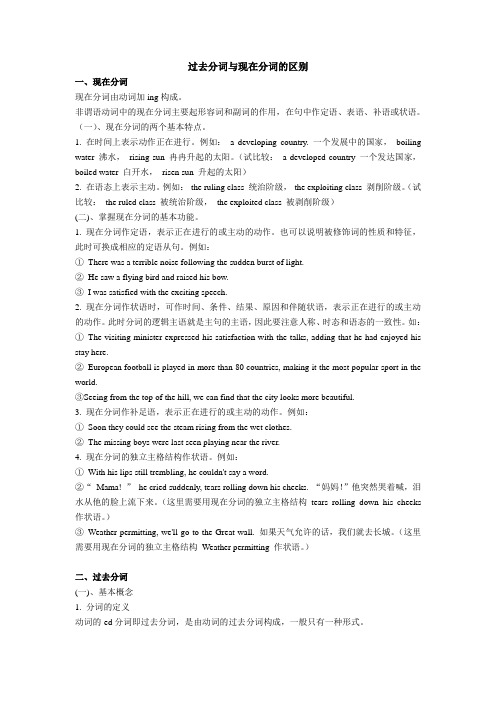
过去分词与现在分词的区别一、现在分词现在分词由动词加ing构成。
非谓语动词中的现在分词主要起形容词和副词的作用,在句中作定语、表语、补语或状语。
(一)、现在分词的两个基本特点。
1. 在时间上表示动作正在进行。
例如:a developing country. 一个发展中的国家,boiling water 沸水,rising sun 冉冉升起的太阳。
(试比较:a developed country 一个发达国家,boiled water 白开水,risen sun 升起的太阳)2. 在语态上表示主动。
例如:the ruling class 统治阶级,the exploiting class 剥削阶级。
(试比较:the ruled class 被统治阶级,the exploited class 被剥削阶级)(二)、掌握现在分词的基本功能。
1. 现在分词作定语,表示正在进行的或主动的动作。
也可以说明被修饰词的性质和特征,此时可换成相应的定语从句。
例如:①There was a terrible noise following the sudden burst of light.②He saw a flying bird and raised his bow.③I was satisfied with the exciting speech.2. 现在分词作状语时,可作时间、条件、结果、原因和伴随状语,表示正在进行的或主动的动作。
此时分词的逻辑主语就是主句的主语,因此要注意人称、时态和语态的一致性。
如:①The visiting minister expressed his satisfaction with the talks, adding that he had enjoyed his stay here.②European football is played in more than 80 countries, making it the most popular sport in the world.③Seeing from the top of the hill, we can find that the city looks more beautiful.3. 现在分词作补足语,表示正在进行的或主动的动作。
高中英语Module2DevelopingandDevelopedCountriesSectionⅠ

该报告最重要的部分之一是人类发展的指数。这是对 175 个国家 成就的检验。这项指标从三个方面衡量一个国家的成就:寿命、教育 和收入。这项指标显示了一些令人感到意外的情况。挪威高居榜首, 而美国则排在第七。其他排名前五的国家分别是:冰岛(2),瑞典(3), 澳大利亚(4),荷兰(5)。英国排在第十三位,而中国则排在名单的中 间。处于末端的十个国家均是非洲国家,塞拉利昂(西非)排在最后。
D.n.收入
( )5.measure
E.n.贫穷
( )6.goal
Fposition ( )cate ( )10.figure
G.vt.教育;培养;训练 H.vt.测定;测量;评估 I.n.位置 J.n.(与动物等对比的)人
【答案】 1-5 CDEBH 6-10 AJIGF
while the US is at number 7.③ The other top five countries are: Iceland (2),Sweden(3),Australia(4),the Netherlands(5).The UK is in the thirteenth position,while China is in the middle of the list.The bottom ten countries are all African countries,with Sierra Leone (in West Africa) at the bottom of the list④.
Module 2 Developing and Developed Countries
发展中国家在第二次世界大战之后迅速崛起,其经济、政治、教 育日益发展,但是在其教育发展的过程中,还存在着一系列的问题和 挑战。
四六级中英段落翻译预测题

大学英语段落翻译【汉译英1】近代以来,亚洲经历了曲折和艰难的发展历程。
亚洲人们为改变自己的命运,始终以不屈的意志和艰辛的奋斗开辟前进道路。
今天,人们所看到的亚洲发展成就,是勤劳智慧的亚洲人民不屈不挠、锲而不舍奋斗的结果。
亚洲人民深知,世界上没有放之四海而皆准的发展模式,也没有一成不变的发展道路,亚洲人民勇于变革创新,不断开拓进取,探索和开辟适应时代潮流,符合自身实际的发展道路,为经济社会发展打开了广阔前景。
【参考译文】In modern times, Asia experienced twists and turns in its development history. In order to change their destiny, the people of Asia have been forging ahead in an indomitable spirit and with hard struggle. Asia's development achievements today are the result of the persistent efforts of the industrious and talented Asian people.The people of Asia are fully aware (or know very well) that there is no ready model or unchanging path of development that is universally applicable. They never shy away from reform and innovation. Instead, they are committed to exploring and finding development paths that are in line with the trend of the times and their own situations, and have opened up bright prospects for economic and social development.【汉译英2】朝气蓬勃,充满活力,丰富多彩的上海是现代中国的缩影。
2015年秋季基础口译题型班中译英必备50句
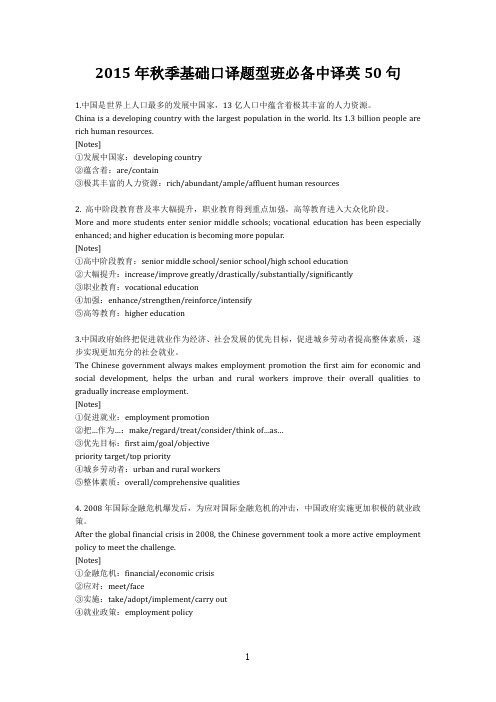
2015年秋季基础口译题型班必备中译英50句1.中国是世界上人口最多的发展中国家,13亿人口中蕴含着极其丰富的人力资源。
China is a developing country with the largest population in the world. Its 1.3 billion people are rich human resources.[Notes]①发展中国家:developing country②蕴含着:are/contain③极其丰富的人力资源:rich/abundant/ample/affluent human resources2. 高中阶段教育普及率大幅提升,职业教育得到重点加强,高等教育进入大众化阶段。
More and more students enter senior middle schools; vocational education has been especially enhanced; and higher education is becoming more popular.[Notes]①高中阶段教育:senior middle school/senior school/high school education②大幅提升:increase/improve greatly/drastically/substantially/significantly③职业教育:vocational education④加强:enhance/strengthen/reinforce/intensify⑤高等教育:higher education3.中国政府始终把促进就业作为经济、社会发展的优先目标,促进城乡劳动者提高整体素质,逐步实现更加充分的社会就业。
The Chinese government always makes employment promotion the first aim for economic and social development, helps the urban and rural workers improve their overall qualities to gradually increase employment.[Notes]①促进就业:employment promotion②把…作为…:make/regard/treat/consider/think of…as…③优先目标:first aim/goal/objectivepriority target/top priority④城乡劳动者:urban and rural workers⑤整体素质:overall/comprehensive qualities4. 2008年国际金融危机爆发后,为应对国际金融危机的冲击,中国政府实施更加积极的就业政策。
考研大作文五大必背范文之三
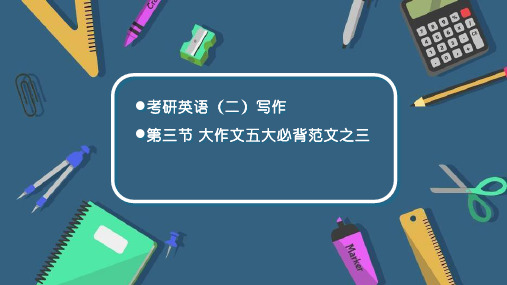
二、五大范文之三:2010年真题(P. 161)
Directions: In this section, you are asked to write an essay
based on the following chart. In your writing, you should
第二段:原因列举 第一句:主题句
至少有两点主要原因造成了这种现象。
第一句:
At least two fundamental factors could have contributed to this phenomenon.
第二句:分论点一
一方面,随着在发展中国家发生的快速经济增长,这 些国家的电信产业必然会适应全球化的需求。
第四句:分论点二
另一方面,发达国家极端先进的文明在私人电信工具 等诸多领域意味着更少的发展潜力,他们对进一步开 发此类工具的需求趋于饱和。
第四句:
On the other hand, the extremely advanced civilization of developed countries means less potential in many aspects including in the area of private telecommunication tools and their demand for further enlargement of such tools tends to saturate.
第三段:归纳结论 第一句:结论句
因此,如果不小心或没有展中国家和发达国家
中均十分流行,这种趋势甚至今天还在继续扩大。
In conclusion, while mobile phones subscriptions, if used carelessly or without restraint, could prove to be a double-edged sword, the fact remains that such phones are already extremely prevalent in both developing and developed countries, and even today continue rise in popularity.
CATTI二级笔译2012年11月汉英翻译真题及参考答案
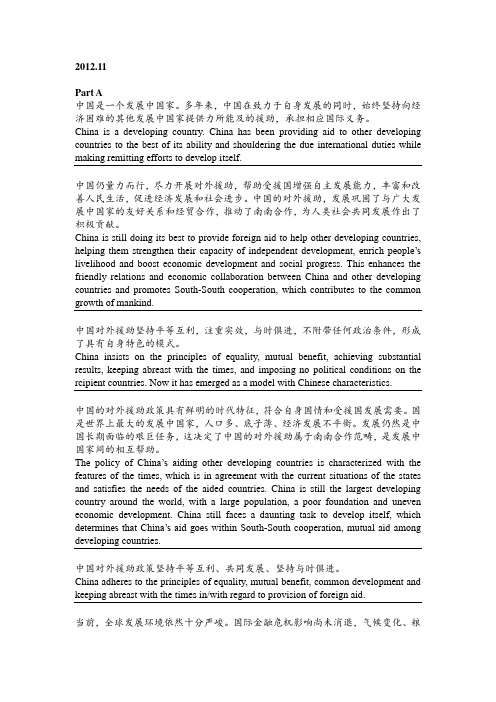
2012.11Part A中国是一个发展中国家。
多年来,中国在致力于自身发展的同时,始终坚持向经济困难的其他发展中国家提供力所能及的援助,承担相应国际义务。
China is a developing country. China has been providing aid to other developing countries to the best of its ability and shouldering the due international duties while making remitting efforts to develop itself.中国仍量力而行,尽力开展对外援助,帮助受援国增强自主发展能力,丰富和改善人民生活,促进经济发展和社会进步。
中国的对外援助,发展巩固了与广大发展中国家的友好关系和经贸合作,推动了南南合作,为人类社会共同发展作出了积极贡献。
China is still doing its best to provide foreign aid to help other developing countries, helping them strengthen their capacity of independent development, enrich people’s livelihood and boost economic development and social progress. This enhances the friendly relations and economic collaboration between China and other developing countries and promotes South-South cooperation, which contributes to the common growth of mankind.中国对外援助坚持平等互利,注重实效,与时倶进,不附带任何政治条件,形成了具有自身特色的模式。
发展经济学ppt课件
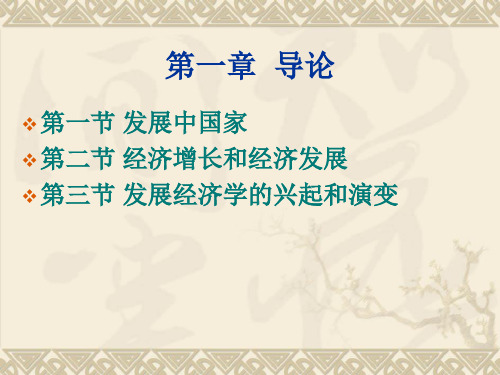
1251.5
1.2.3 经济发展的衡量指标
❖ 1.世界银行使用人均GNP这一简单的指标来衡量各 个国家的发展水平。优点:易于操作;缺陷:因为 它只是一个平均值,因此不能反映收入的分配状况。
Industry
Services
2005 13 0 4w 22 10
2005 46 10 28w 28 37
2005 41 90 68w 50 53
13
41
46
7
32
62
12
36
52
13
45
42
8
32
60
8
32
60
11
41
48
19
27
54
17
32
51
2
26
72
Household final cons. expenditure
1.1.3. 发展中国家的基本特征
1. 收入水平低下 2. 生活水平低下 3. 生产率水平低下 4. 人口增长率高、赡养负担重 5. 失业问题严重 6. 农业部门和农村人口所占比重大 7. 初级产品出口比重大而且品种单一 8. 二元经济结构显著 9. 国际关系中处于受支配的地位
9
劳动生产率的国际比较
❖ United Kingdom;
United States
6
7
Note: This table classifies all World Bank member economies, and all other economies with populations of more than 30,000. Economies are divided among income groups according to 2006 GNI per capita, calculated using the World Bank Atlas method. The groups are: low income (LIC), $905 or less; lower middle income (LMC), $906–3,595; upper middle income (UMC), $3,596–11,115; and high income, $11,116 or mor8e.
雅思大作文国际
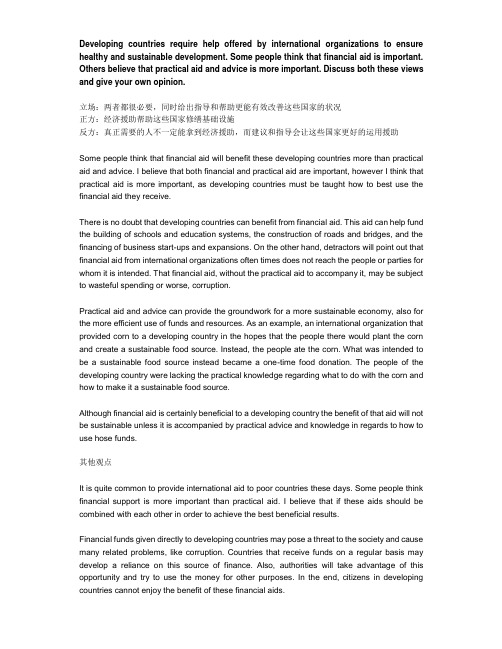
Developing countries require help offered by international organizations to ensure healthy and sustainable development. Some people think that financial aid is important. Others believe that practical aid and advice is more important. Discuss both these views and give your own opinion.立场:两者都很必要,同时给出指导和帮助更能有效改善这些国家的状况正方:经济援助帮助这些国家修缮基础设施反方:真正需要的人不一定能拿到经济援助,而建议和指导会让这些国家更好的运用援助Some people think that financial aid will benefit these developing countries more than practical aid and advice. I believe that both financial and practical aid are important, however I think that practical aid is more important, as developing countries must be taught how to best use the financial aid they receive.There is no doubt that developing countries can benefit from financial aid. This aid can help fund the building of schools and education systems, the construction of roads and bridges, and the financing of business start-ups and expansions. On the other hand, detractors will point out that financial aid from international organizations often times does not reach the people or parties for whom it is intended. That financial aid, without the practical aid to accompany it, may be subject to wasteful spending or worse, corruption.Practical aid and advice can provide the groundwork for a more sustainable economy, also for the more efficient use of funds and resources. As an example, an international organization that provided corn to a developing country in the hopes that the people there would plant the corn and create a sustainable food source. Instead, the people ate the corn. What was intended to be a sustainable food source instead became a one-time food donation. The people of the developing country were lacking the practical knowledge regarding what to do with the corn and how to make it a sustainable food source.Although financial aid is certainly beneficial to a developing country the benefit of that aid will not be sustainable unless it is accompanied by practical advice and knowledge in regards to how to use hose funds.其他观点It is quite common to provide international aid to poor countries these days. Some people think financial support is more important than practical aid. I believe that if these aids should be combined with each other in order to achieve the best beneficial results.Financial funds given directly to developing countries may pose a threat to the society and cause many related problems, like corruption. Countries that receive funds on a regular basis may develop a reliance on this source of finance. Also, authorities will take advantage of this opportunity and try to use the money for other purposes. In the end, citizens in developing countries cannot enjoy the benefit of these financial aids.Practical aid and advice, on the other hand, may contribute more. International organizations can build public facilities schools, libraries to offer locals opportunities to receive education in order to find jobs in the future. The positive effects may not be seen in a short period of time, but in the long run, the educated workforce will break their country's reliance on financial aid from other countries and boost their economy independently.In my opinion, I believe that financial aid and for sustainable development are equally important for people in developing countries. International organizations can support these financially struggling countries with funds especially when their citizens are suffering from serious problems like famine. While if it is not in an emergent situation. Instead of asking for money, many of these countries truly need technicians to teach them how to build power plants and dams. So, donators may double check with recipients and make sure that the aid is what they really need.Some people believe that rich countries should provide poorer countries with other types of help rather than financial aid. To what extent do you agree or disagree?立场:强烈赞成正方:经济援助使用妥当,会让贫穷国家的经济更健康的发展反方:长期来看,单给钱不一定能是最好的,应辅以其他的援助,比如:科技,财政指导Some people believe that it would be better for rich countries to provide poorer countries with types of aid other than just financial aid. I agree strongly with that premise.There is no doubt that poorer countries can benefit from financial aid. Money is required to build and maintain a healthy economy in any country. Financial aid, if used wisely and effectively, can become the lifeblood of any economy that aims to be self-sustaining.That being said, other forms of aid may be more effective in guaranteeing the long-term success and sustenance of the developing country's economy. Other forms of aid might include technological aid or expertise, manpower, financial and educational expertise etc. Countries would be able to use technological aid to become more relevant in the worldwide market. They could use educational expertise to develop education systems which will allow for the country to educate its young people and eventually reap the economical benefits of an educated society. The developing countries could use the financial expertise offered by other countries to determine how best to use their financial resources and how best to develop financial plans and systems that will encourage a prosperous economy.In conclusion financial aid offered by richer countries to poorer countries can be vital for those poorer countries as they try to develop vibrant and sustainable economies. However, that being said, richer countries might be better served to offer other types of help other than just financial help, or relevant help to accompany the financial aid they are offering.其他观点Financial aids to developing nations provided by developed countries are quite common in theworld. Although financial support, I believe other forms of support could be more helpful.Other kinds of aid, such as education can be a great approach to solve problems in developing countries. In many poor nations, the social problems are very severe due to the fact that most people are under-educated. If rich countries can provide scholarship or build public schools for the children there, crimes would be mitigated, and in the long run, the well-educated workforce can develop the economy of their country by themselves.Also, providing construction material and technology for public facilities is effective. The improvement of public infrastructure, such as libraries, water and electricity supply system and public transport system, in a way contributes to higher productivity as people would less likely be affected by bad public services and save more time and energy for their work.On the other hand, direct financial support may not benefit people in poorer countries as expected. The government in these countries might use the donating money for other purposes. Consequently, the people in need will still suffer. Moreover, some nations try to interfere with other countries' politics by aiding them financially. So, financial support is not the perfect way to solve social problems in poorer nations.In conclusion, the money donated to developing countries cannot completely solve poor countries' problems, so international aids should be provided in other forms, such as education or the construction of public facilities.Most of the urgent problems can only be solved with international cooperation. To what extent do you agree or disagree?立场:同意1. 以环境问题为例,环境问题已经是全球化问题。
中国是发展中国家英语作文节约资源

中国是发展中国家英语作文节约资源全文共3篇示例,供读者参考篇1China is a developing country that has made remarkable progress in recent years. However, as a nation with a large population and limited resources, it is important for China to focus on resource conservation in order to achieve sustainable development. In this essay, we will explore the importance of resource conservation in China and discuss some of the measures that can be taken to promote this goal.One of the key reasons why resource conservation is essential for China is the fact that the country is home to a significant portion of the world's population. With over 1.4 billion people, China is one of the most populous countries in the world. This means that the demand for resources such as energy, water, and food is incredibly high. If China does not actively work to conserve these resources, it is likely that they will run out in the future, leading to serious consequences for both the country and the world as a whole.Another reason why resource conservation is important for China is the fact that the country is facing a number of environmental challenges. China is one of the world's largest producers of greenhouse gases, which contribute to global warming and climate change. In addition, the country is experiencing serious air and water pollution, which pose significant health risks to its citizens. By conserving resources and reducing waste, China can help to mitigate these environmental challenges and create a healthier and more sustainable future for its people.In order to promote resource conservation in China, it is important for the government to take a proactive approach. This can be done through the implementation of regulations and policies that encourage resource conservation and discourage wasteful practices. For example, the government could introduce incentives for companies that reduce their energy consumption or produce less waste. In addition, the government could invest in renewable energy sources such as solar and wind power, which are more sustainable in the long term.Individuals in China can also play a role in promoting resource conservation. By making small changes in their daily lives, such as turning off lights when they are not in use or usingpublic transportation instead of driving, individuals can help to reduce their impact on the environment and conserve valuable resources. Education and awareness campaigns can also be effective in promoting resource conservation among the general public.In conclusion, resource conservation is critically important for China as a developing country with a large population and limited resources. By focusing on resource conservation, China can create a more sustainable future for its people and help to address the environmental challenges that the country is facing. It is essential for both the government and individuals to work together to promote resource conservation and ensure a better future for China and the world.篇2China is a developing country with a rapidly growing economy, and it is facing the challenge of limited resources and environmental sustainability. As one of the world's largest economies, China has been actively working towards sustainable development and resource conservation.One of the key strategies that China has implemented to promote resource conservation is the promotion of a circulareconomy. Circular economy is an economic system aimed at minimizing waste and making the most of resources. In a circular economy, resources are reused, recycled, and restored, thus reducing the need for new resources and minimizing environmental impact.China has been investing heavily in the development of renewable energy sources, such as solar and wind power, to reduce its reliance on fossil fuels. The country has also been investing in energy-efficient technologies and implementing policies to promote energy conservation and reduce greenhouse gas emissions.In addition to energy conservation, China has also been promoting water conservation and sustainable agriculture. The country has been investing in water-saving technologies and practices to reduce water consumption in agriculture and industry. China has also been promoting sustainable agricultural practices, such as organic farming and crop rotation, to preserve soil fertility and reduce the use of chemical fertilizers and pesticides.Another important aspect of resource conservation in China is waste management. China has been implementing policies to promote waste reduction, recycling, and proper disposal. Thecountry has been investing in waste-to-energy technologies to convert waste into energy and reduce landfill waste.Furthermore, China has been working towards promoting sustainable consumption and production patterns. The country has been implementing policies to promote eco-friendly products and services, as well as green consumer behavior. China has also been promoting the development of a sharing economy, where resources are shared and reused, reducing the need for new resources.In conclusion, China is a developing country that is making significant efforts to promote resource conservation and sustainable development. Through the promotion of a circular economy, renewable energy, water conservation, waste management, and sustainable consumption and production, China is working towards a more sustainable future. It is essential for China to continue its efforts towards resource conservation and environmental sustainability to ensure a better future for its citizens and the planet.篇3China is a developing country with a rapidly growing economy and population. As the world's most populous nation,China faces the challenge of limited resources and increasing demand for energy, water, and other essential resources. In order to sustain its development and protect the environment, China has made significant efforts to promote resource conservation and sustainable development.One of the key strategies that China has implemented to conserve resources is the promotion of energy efficiency and renewable energy sources. China is currently the world's largest producer of renewable energy, including wind, solar, and hydroelectric power. In recent years, China has invested heavily in renewable energy infrastructure and technology, with a goal of reducing its reliance on fossil fuels and cutting carbon emissions.In addition to promoting renewable energy sources, China has also made efforts to improve energy efficiency in various sectors of the economy. The government has implemented energy efficiency standards for buildings, appliances, and vehicles, and has encouraged industries to adopt more efficient production processes. These efforts have helped China to reduce its energy intensity and curb growth in energy consumption.Water conservation is another important priority for China, as the country faces increasing water scarcity and pollution.China has implemented a range of measures to improve water efficiency and quality, including water pricing reforms,water-saving technologies, and pollution control measures. The government has also launched large-scale water conservation projects, such as the South-to-North Water Diversion Project, to address regional water shortages.China has also made progress in promoting resource conservation in the agriculture and forestry sectors. The government has implemented policies to promote sustainable land use practices, reduce deforestation, and enhance soil conservation. China has also implemented programs to promote sustainable agriculture practices, such as organic farming and integrated pest management.In conclusion, China is making significant efforts to promote resource conservation and sustainable development. By investing in renewable energy, improving energy efficiency, and implementing water conservation measures, China is working to ensure a more sustainable future for its people and the planet.中国是一个发展中国家,经济和人口迅速增长。
Unit5Ontheroad现在分词作定语详解与练习()(原卷版)
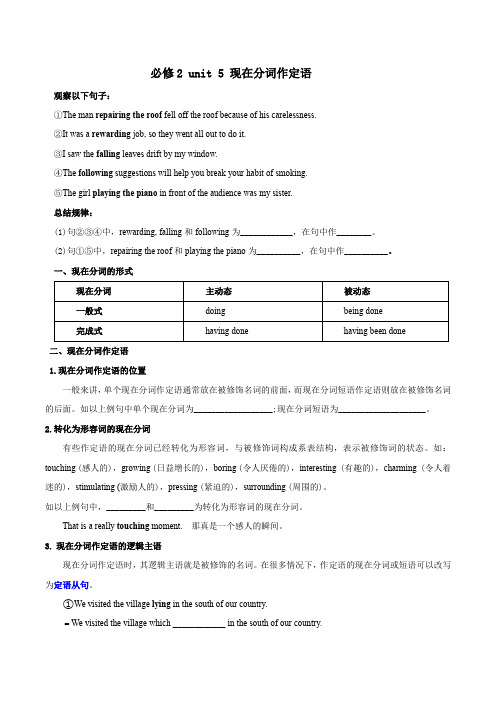
必修2 unit 5 现在分词作定语观察以下句子:①The man repairing the roof fell off the roof because of his carelessness.②It was a rewarding job, so they went all out to do it.③I saw the falling leaves drift by my window.④The following suggestions will help you break your habit of smoking.⑤The girl playing the piano in front of the audience was my sister.总结规律:(1)句②③④中,rewarding, falling和following为____________,在句中作________。
(2)句①⑤中,repairing the roof和playing the piano为__________,在句中作__________。
一、现在分词的形式二、现在分词作定语1.现在分词作定语的位置一般来讲,单个现在分词作定语通常放在被修饰名词的前面,而现在分词短语作定语则放在被修饰名词的后面。
如以上例句中单个现在分词为__________________;现在分词短语为____________________。
2.转化为形容词的现在分词有些作定语的现在分词已经转化为形容词,与被修饰词构成系表结构,表示被修饰词的状态。
如:touching (感人的),growing (日益增长的),boring (令人厌倦的),interesting (有趣的),charming (令人着迷的),stimulating (激励人的),pressing (紧迫的),surrounding (周围的)。
如以上例句中,_________和_________为转化为形容词的现在分词。
中国是发展中国家英语作文节约资源

中国是发展中国家英语作文节约资源全文共10篇示例,供读者参考篇1China is a developing country, we need to save resources!Hi everyone, I'm Lily, and I want to talk to you about how important it is to save resources in China. China is a big country with lots of people, and we need to make sure we don't waste our resources.One of the most important resources we need to save is water. Water is essential for all living things, and we need to make sure we don't waste it. We can do things like turning off the tap when we brush our teeth, taking shorter showers, and fixing any leaks in our homes.Another important resource we need to save is energy. Energy is what powers our homes, schools, and hospitals, and we need to make sure we don't waste it. We can do things like turning off lights when we leave a room, unplugging electronics when we're not using them, and using energy-efficient appliances.We also need to save resources like paper and plastic. We can reduce, reuse, and recycle these materials to make sure we're not wasting them. We can use both sides of a piece of paper before recycling it, bring our own bags when we go shopping, and recycle our plastic bottles and containers.By saving resources, we can help protect the environment and make sure there's enough for everyone. So let's all do our part to save resources in China! Thank you for listening.篇2China is a developing country, and we need to save resources to help our country develop better. Saving resources is very important for our future. We should not waste things like water, electricity, and paper.First of all, we need to save water. Water is very important for us to live. We should not waste water when we brush our teeth or take a shower. We can also save water by fixing leaks in our house.Secondly, we need to save electricity. Electricity is used to power our lights and electronics. We can save electricity by turning off lights when we leave a room and unplugging ourdevices when we are not using them. We can also useenergy-saving light bulbs and appliances.Lastly, we need to save paper. Paper comes from trees, and cutting down trees is not good for the environment. We can save paper by using both sides of a piece of paper and recycling it when we are done. We should also try to use electronic devices instead of printing things out.In conclusion, saving resources is very important for our country. We should all do our part to save water, electricity, and paper. If we work together, we can make a big difference for the future of China. Let's all do our best to save resources!篇3China is a developing country. We need to save resources!Hi everyone! I want to talk about saving resources in China. China is a big country with lots of people. We need to use resources wisely so that there is enough for everyone.First, we need to save water. Water is very important for us to live. We should not waste it by leaving the tap running when we brush our teeth or taking long showers. We can also collect rainwater to water plants and gardens.Second, we need to save electricity. We can turn off lights when we leave a room and unplug electronic devices when we are not using them. We can also use energy-efficient light bulbs and appliances.Third, we need to save paper. We can use both sides of a piece of paper before throwing it away. We can also use digital devices to store information instead of printing everything out.Fourth, we need to reduce waste. We can recycle things like plastic bottles, cans, and paper. We can also try to buy products with less packaging to reduce the amount of trash we create.By saving resources, we can help protect the environment and make sure there is enough for future generations. Let's all do our part to save resources in China! Thank you!篇4Title: China, a Developing Country, Needs to Save ResourcesHi everyone! Today, let's talk about saving resources in China. As a developing country, China needs to be careful with how we use things like water, electricity, and paper. We don't want to waste them! Let's learn how we can do our part to help the environment and save resources.First of all, let's talk about water. Water is very important for all living things, including us! In China, some areas don't have enough water, so it's important for us to use water wisely. We should take shorter showers, turn off the tap when we brush our teeth, and fix any leaks in our homes. By using water carefully, we can help make sure there's enough for everyone.Next, let's talk about electricity. Electricity is what powers our TVs, computers, and lights. But using too much electricity can be bad for the environment. We can save electricity by turning off lights when we leave a room, unplugging our devices when we're not using them, and using energy-saving light bulbs. By using less electricity, we can help reduce pollution and protect our planet.Lastly, let's talk about paper. Paper comes from trees, so it's important for us to use it wisely. We can save paper by using both sides of a piece of paper, recycling paper when we're done with it, and using less paper overall. We can also try using electronic devices like tablets and computers instead of printing things out on paper. By saving paper, we can help protect the forests and the animals that live there.In conclusion, as a developing country, China needs to do our part to save resources. By using water, electricity, and paperwisely, we can help protect the environment and make sure there's enough for everyone. So let's all work together to save resources and make our world a better place for the future. Thank you for listening!篇5Hey guys, do you know that China is a developing country? Yup, that's right! And as a developing country, it's super important for us to save resources. So, let's talk about why it's important to save resources and how we can do our part to help China become a better place for all of us.First of all, resources are things like water, fuel, and electricity that we need to live. But if we use too much of these resources, there might not be enough for everyone in the future. That's why it's super important to save resources now, so we don't run out later on. Plus, saving resources helps the environment too, by reducing pollution and protecting animals and plants.So, how can we save resources? Well, there are lots of simple things we can do to help. For example, we can take shorter showers to save water, turn off lights when we're not using them to save electricity, and ride our bikes or walk instead of driving tosave fuel. We can also recycle our old toys and books, so we can use them again instead of throwing them away.Another way we can save resources is by spreading the word to our friends and family. We can tell them about why it's important to save resources and share tips on how they can help too. The more people who know about the importance of saving resources, the more people will join in and make a difference.So, let's all do our part to save resources and make China a better place for us and future generations. Remember, every little bit helps, and together, we can make a big difference! Let's go, team China!篇6China is a developing country, but we are working hard to save resources! We know that it's important to use things wisely and not waste them. Our teachers tell us that resources like water, electricity, and food are precious. So we have to be careful and not use more than we need.One way we save resources is by turning off the lights when we leave a room. It's simple, but it can make a big difference. We also make sure to turn off the tap when we're brushing our teeth. That way we don't waste water.In our school, we have recycling bins for paper, plastic, and glass. We learn how to sort our waste so that it can be recycled and used again. It's important to reduce waste and save our planet.When we go to the cafeteria, we try to take only as much food as we can eat. We don't want to waste food because there are people in the world who don't have enough to eat. We also bring our own bags when we go shopping so that we don't use plastic bags.Our parents are also teaching us how to save resources at home. We turn off the TV and computer when we're not using them. We take shorter showers to save water. We also try to use less paper by writing on both sides of the paper.China is working hard to be a responsible country and save resources. We know that it's important for our future and the future of our planet. So let's all do our part and make a difference!篇7Title: China, the Developing Country, Needs to Save ResourcesHey everyone! Do you know that China is a developing country? Yes, that's right! But even though we are still developing, we should remember to save resources. Why is it important to save resources? Let me tell you why!First of all, saving resources is good for the environment. We all know that the earth is our home, and we need to take care of it. If we use too many resources, like water and electricity, we could harm the environment and affect plants and animals. So, saving resources is important to keep our planet healthy.Secondly, saving resources is also good for our future. If we use up all the resources now, what will happen in the future? We won't have enough resources for our children and grandchildren. That's why it's important to use resources wisely and save them for the future.Now, let's talk about some ways we can save resources. One way is to turn off the lights when we leave a room. Do you know that leaving lights on wastes electricity? So, remember to turn off the lights when you don't need them. Another way is to save water by taking shorter showers and fixing leaky faucets. Water is a precious resource, so let's not waste it!We can also save resources by recycling. Do you know what recycling is? It's when we reuse old things, like paper and plastic,to make new things. By recycling, we can save trees and reduce the amount of waste that goes into landfills. So, remember to recycle whenever you can.In China, we have been working hard to save resources. We have set up laws and policies to encourage people to use resources efficiently. For example, we have regulations on water and energy conservation to reduce waste. We have also launched campaigns to promote recycling and reduce pollution. We are making progress, but we still have a long way to go.So, let's all do our part to save resources. Remember, even though China is a developing country, we can still make a difference by using resources wisely. Together, we can build a sustainable future for ourselves and for the generations to come. Let's work together to save resources and protect our planet!篇8China is a developing country which means we need to save resources. Resources are things like water, electricity, and food. We need to use them carefully so we don't run out.One way we can save resources is by turning off the lights when we leave a room. Electricity is a resource that we need touse wisely. We can also save water by taking shorter showers and turning off the faucet when we brush our teeth.Another way to save resources is by not wasting food. We can eat all our food on our plates and not throw it away. Food is a precious resource that we need to appreciate and not waste.We can also save resources by recycling. Recycling means we can use things again instead of throwing them away. We can recycle paper, cans, and plastic to save resources and protect the environment.In conclusion, as a developing country, China needs to save resources. We can do this by turning off lights, saving water, not wasting food, and recycling. Let's all work together to save resources and make China a better place for the future!篇9China is a developing country that has made great progress in recent years. However, we still need to work hard to save resources and protect the environment. It's really important for us to do this so that we can have a better future.First of all, we need to save water. Water is a precious resource that we cannot live without. We should take shortershowers, turn off the faucet while brushing our teeth, and fix any leaking pipes in our homes. We can also use rain barrels to collect rainwater for our plants and gardens. By saving water, we can ensure that there is enough for everyone, now and in the future.Secondly, we need to save energy. Energy is what powers our homes, schools, and cars. We can save energy by turning off lights when we leave a room, unplugging electronics when they are not in use, and using energy-efficient appliances. We can also walk or ride a bike instead of driving a car, which can help reduce air pollution and save energy. By saving energy, we can protect our environment and reduce our carbon footprint.Thirdly, we need to reduce waste. We produce a lot of waste every day, from plastic bottles to food scraps. We can reduce waste by using reusable bags, bottles, and containers, and by composting our food scraps. We can also recycle paper, plastic, and glass to reduce the amount of waste that goes into landfills. By reducing waste, we can conserve resources and protect our planet for future generations.In conclusion, as students in China, we have a responsibility to save resources and protect the environment. By saving water, energy, and reducing waste, we can ensure that there is enoughfor everyone and create a sustainable future. Let's all do our part to make a difference!篇10Title: China is a Developing Country - Let's Save Resources!Hey everyone! Today I want to talk about something super important - saving resources in China. As a developing country, we need to make sure we use our resources wisely so that we can continue to grow and develop in a sustainable way.First of all, let's talk about why it's important to save resources. China is a big country with a lot of people, and we use a ton of resources every day. If we use up all our resources too quickly, there won't be enough left for future generations. That's why it's so important for us to be mindful of how we use things like water, energy, and food.One way we can save resources is by being more mindful of our water usage. Water is super important for all sorts of things, like drinking, washing, and growing food. We can save water by taking shorter showers, turning off the faucet when we brush our teeth, and fixing leaks in our homes. Every little bit helps!Another way we can save resources is by using energy more efficiently. We can do things like turning off lights when we leave a room, unplugging electronics when we're not using them, and using energy-efficient appliances. By using less energy, we can help reduce our carbon footprint and protect the environment.We can also save resources by reducing food waste. Did you know that a lot of food gets thrown away each year, even though it's still perfectly good to eat? We can help reduce food waste by planning our meals, using up leftovers, and composting food scraps. Not only will this help save resources, but it will also help reduce pollution and greenhouse gas emissions.In conclusion, saving resources is super important for China as a developing country. By being mindful of how we use things like water, energy, and food, we can ensure a sustainable future for ourselves and future generations. So let's all do our part to save resources and protect the environment.Together, we can make a difference!。
Developed country
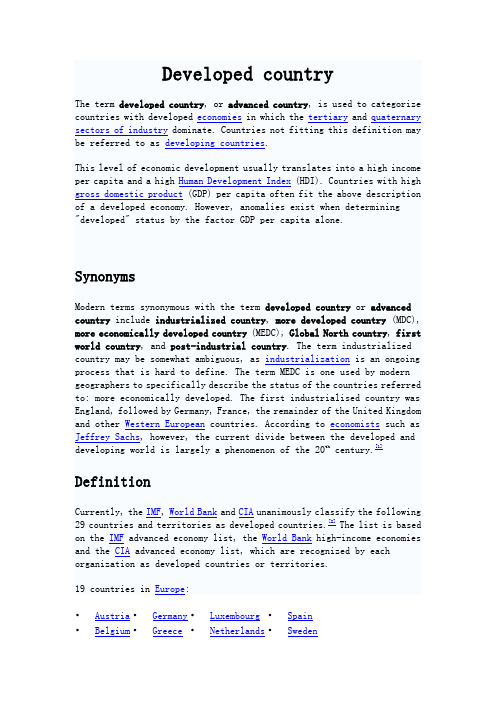
• Austria• Germany• Luxembourg• Spain • Belgium• Greece• Netherlands• Sweden• Denmark• Iceland• Norway• Switzerland • Finland• Ireland• Portugal• United Kingdom • France• Italy• San Marino• Hong Kong• Japan• South Korea• Israel• Singapore• Taiwan• Canada• United States• Australia• New ZealandExclusionsHuman Development IndexThe UN HDI is a statistical measure that gauges a country's level of human development. While there is a strong correlation between having a high HDI score and a prosperous economy, the UN points out that the HDI accounts for more than income or productivity. Unlike GDP per capita or per capita income, the HDI takes into account how income is turned "into education and health opportunities and therefore into higher levels of human development." A few examples are Italy and the United States. Despite a relatively large difference in GDP per capita, both countries rank roughly equal in term of overall human development.[3] Since 1980, Norway (2001-2005), Japan (1991 and 1993), Canada (1985, 1992 and 1994-2000), Iceland(2006-2008) and Switzerland (1980) have had the highest HDI score. Countries with a score of over 0.800 are considered to have a "high" standard of human development. The top 30 countries have scores ranging from 0.912 in Cyprus to 0.968 in Iceland. All countries included in the UN study on the IMF list had a high HDI. Several small countries, such as Andorra, Liechtenstein and Macau were not reviewed by the United Nations. Thus, these countries have not received an official HDI score.[4]All countries listed by IMF or[5]CIA as "advanced" (as of 2007) - possess an HDI over 0.9 (as of 2004). All countries[6] possessing an HDI of 0.9 and over (as of 2004) - are also listed by IMF or CIA as "advanced" (as of 2007). Thus, all "advanced economies" (as of 2007) are characterized by an HDI score of 0.9 or higher (as of 2004).The latest index was released on December 18, 2008. This so-called "statistical update" covers the period up to 2006 and was published without an accompanying report on human development. The update is relevant due to newly released estimates of purchasing power parities (PPP), implying substantial adjustments for many countries, resulting in changes in HDI values and, in many cases, HDI ranks.[7]1.Norway 0.968 (▬)2.Iceland 0.968 (▬)3.Canada 0.967 (▲11. France 0.955(▼ 1)12. Finland 0.954(▼ 1)21. United Kingdom0.942 (▼ 4)22. Hong Kong 0.942(▼ 1)1)4.Australia 0.965(▼ 1)5.Ireland 0.960 (▬)6.Sweden 0.958 (▬)herlands 0.958(▲) 3)8.Japan 0.956 (▬)9.Luxembourg 0.956(▲ 10)10. Switzerland 0.955(▼ 3) 13. Denmark 0.952(▲ 1)14. Austria 0.951(▲ 1)15. United States0.950 (▼ 3)16. Spain0.949 (▼3)17. Belgium 0.948(▼ 1)18. Greece 0.947(▲ 6)19. Italy0.945 (▲1)20. New Zealand0.944 (▼ 1)23. Germany0.940 (▼1)24. Israel 0.930 (▼1)25. South Korea0.928(▲ 1)26. Slovenia 0.923(▲ 1)27. Brunei 0.919 (▲3)28. Singapore 0.918(▼ 3)29. Kuwait 0.912 (▲4)30. Cyprus 0.912 (▼1)Lists of prosperous economiesWhile there is no official guideline for which country may or may not be considered developed, different institutions have created certain categories for the economically most prosperous countries. The IMF identifies 32 "advanced economies",[8] while the CIA identifies 34 "developed countries" and 35 "advanced economies".[9] The World Bank identifies 66 "high income countries", which are classified either as developed or developing by the UN. The criteria used to create these lists differ across these organizations as does the placement of certain countries.CIA advanced economy listThe official classification of "advanced economies" was originally made by the IMF. The CIA intends to follow the IMF but also to add non-IMF members. Thus, until March 2001, the CIA list was more comprehensive than• Andorra • FaroeIslands• Iceland• Monaco• South Korea• Australia• Finland• Ireland• Netherlands• Spain• Austria• France• Israel• New Zealand• Sweden• Belgium• Germany• Italy• Norway• Switzerland • Bermuda• Greece• Japan• Portugal• Taiwan• Canada• Holy See• Liechtenstein• San Marino • United Kingdom• Denmark • HongKong• Luxembourg• Singapore• UnitedStatesCIA developed country list“the top group in the hierarchy of developed countries (DCs), former USSR/Eastern Europe (former USSR/EE), and less developedcountries (LDCs); includes the market-oriented economies of themainly democratic nations in the Organization for EconomicCooperation and Development (OECD), Bermuda, Israel, SouthAfrica, and the European ministates; also known as the FirstWorld, high-income countries, the North, industrial countries;generally have a per capita GDP in excess of $10,000 althoughfour OECD countries and South Africa have figures well under$10,000 and two of the excluded OPEC countries have figures ofmore than $10,000; the 34 DCs are: Andorra, Australia, Austria,Belgium, Bermuda, Canada, Denmark, Faroe Islands, Finland,France, Germany, Greece, Holy See, Iceland, Ireland, Israel,Italy, Japan, Liechtenstein, Luxembourg, Malta, Monaco,Netherlands, NZ, Norway, Portugal, San Marino, South Africa,Spain, Sweden, Switzerland, Turkey, UK, US; note - similar tothe new International Monetary Fund (IMF) term "advancedeconomies" that adds Hong Kong, South Korea, Singapore, andTaiwan but drops Malta, Mexico [sic],[10] South Africa, andTurkey. ”IMF advanced economy listCountries described as Advanced Economies by the IMF.According to the International Monetary Fund the following 32 countries are classified as "advanced economies:"[8]• Australia• Germany• Luxembourg• Slovenia• Austria• Greece• Malta• South Korea• Belgium• Hong Kong• Netherlands• Spain• Canada• Iceland• New Zealand• Sweden• Cyprus• Ireland• Norway• Switzerland• Denmark• Israel• Portugal• Taiwan• Finland• Italy• San Marino[11]• United Kingdom• France• Japan• Singapore• United States∙Andorra ∙AntiguaandBarbuda ∙Aruba ∙Canada∙CaymanIslands∙ChannelIslan∙FrenchPolynesia∙Germany∙Greece∙Italy∙Japan∙Kuwait∙Liechtenstein∙Luxembourg∙Macau∙Malta∙NewZealand∙NorthernMarianaIsla∙Slovenia∙SouthKorea∙Spain∙Sweden∙Switzerland∙Australia∙Austria ∙TheBahamas ∙Bahrain ∙Barbados∙Belgium ∙Bermuda ∙Bruneids∙Cyprus∙CzechRepublic∙Denmark∙EquatorialGuinea∙Estonia∙FaroeIslands∙Finland∙France∙Greenland∙Guam∙HongKong∙Hungary∙Iceland∙Ireland∙Isle ofMan∙Israel∙Monaco∙Netherlands∙NetherlandsAntilles∙NewCaledoniands∙Norway∙Oman∙Portugal∙PuertoRico∙Qatar∙SanMarino∙SaudiArabia∙Singapore∙Slovakia∙Taiwan∙TrinidadandTobago∙United ArabEmirates∙UnitedKingdom∙UnitedStates∙U.S.VirginIslands。
动名词现在分词不定式

英语中,非限定动词也叫非谓语动词,也就是不定式、分词和动名词。
顾名思义,不定式、分词和动名词在英语句子中是不能做作谓语的。
非谓语动词虽然不能在句子中作谓语,但由于它们本身具有动词的一些特征,它们在句子中的运用是非常活跃的。
他们之间的用法既有共同点,又有一定的区别,是历年高考必考的语法项目,例如NMET2005年单项填空题(全国卷)中就有这样一题:32,The storm left, ________ a lot of damage to this area.A. causedB. to have causedC. to causedD. having caused根据题意,本题应选D------分词作状语,表示结果。
如何正确地运用好非谓语动词,是许多学生普遍感到棘手的问题,本文将就不定式、分词和动名词的词性特征和句法功能等方面进行比较,帮助学生正确地运用好非谓语动词。
一、基本形式a.不定式的基本形式是“小品词to﹢动词原形”即to﹢v. ;但有时也可省去to, 即:(to) ﹢v. 。
b.分词有两种基本形式:现在分词(the present participle)和过去分词(the past participle)。
①现在分词的基本形式是动词的—ing形式,如,writing, doing ,working ,going, etc.②过去分词的基本形式是:a) 规则动词﹢ed, 即v.-ed, 如,visit→visited ,ask→asked ,dig→digged ,etc; b) 不规则动词有其自身的过去式和过去分词,学生需要用心熟记,方能正确使用。
如,go→went→gone; do→did→done, etc .c.动名词的基本形式与现在分词的基本形式相同,都是动词的—ing 形式,如,doing ,writing ,doing ,etc .二、时态、语态及其基本用法A. 不定式1.不定式的时态、语态有三种形式:①一般式,如,to write / to be written ;②进行式,如,to be writing / to have been writing;③完成式,如,to have written / to have been written 。
汉译英非谓语练习200句参考答案
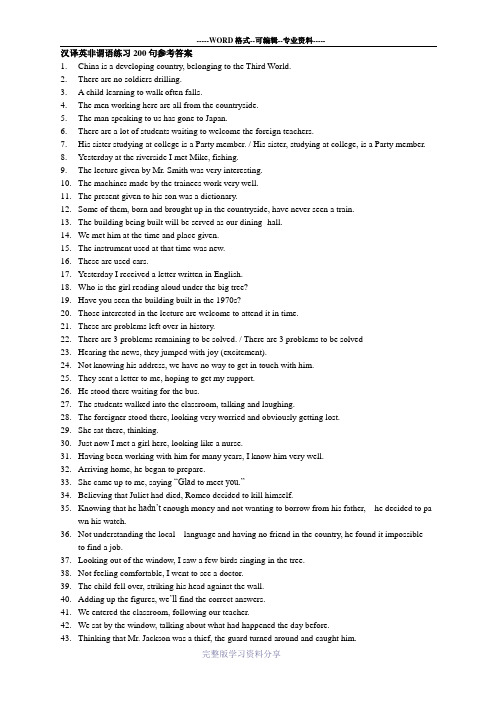
汉译英非谓语练习200句参考答案1.China is a developing country, belonging to the Third World.2.There are no soldiers drilling.3. A child learning to walk often falls.4.The men working here are all from the countryside.5.The man speaking to us has gone to Japan.6.There are a lot of students waiting to welcome the foreign teachers.7.His sister studying at college is a Party member. / His sister, studying at college, is a Party member.8.Yesterday at the riverside I met Mike, fishing.9.The lecture given by Mr. Smith was very interesting.10.The machines made by the trainees work very well.11.The present given to his son was a dictionary.12.Some of them, born and brought up in the countryside, have never seen a train.13.The building being built will be served as our dining- hall.14.We met him at the time and place given.15.The instrument used at that time was new.16.These are used cars.17.Yesterday I received a letter written in English.18.Who is the girl reading aloud under the big tree?19.Have you seen the building built in the 1970s?20.Those interested in the lecture are welcome to attend it in time.21.These are problems left over in history.22.There are 3 problems remaining to be solved. / There are 3 problems to be solved23.Hearing the news, they jumped with joy (excitement).24.Not knowing his address, we have no way to get in touch with him.25.They sent a letter to me, hoping to get my support.26.He stood there waiting for the bus.27.The students walked into the classroom, talking and laughing.28.The foreigner stood there, looking very worried and obviously getting lost.29.She sat there, thinking.30.Just now I met a girl here, looking like a nurse.31.Having been working with him for many years, I know him very well.32.Arriving home, he began to prepare.33.She came up to me, saying “Gla d to meet you.”34.Believing that Juliet had died, Romeo decided to kill himself.35.Knowing that he hadn’t enough money and not wanting to borrow from his father, he decided to pawn his watch.36.Not understanding the local language and having no friend in the country, he found it impossibleto find a job.37.Looking out of the window, I saw a few birds singing in the tree.38.Not feeling comfortable, I went to see a doctor.39.The child fell over, striking his head against the wall.40.Adding up the figures, we’ll find the correct answers.41.We entered the classroom, following our teacher.42.We sat by the window, talking about what had happened the day before.43.Thinking that Mr. Jackson was a thief, the guard turned around and caught him.44.Helen borrowed a dictionary from me, saying that she would return it to me soon.45.Being ill, I had to stay at home.46.Climbing to the top of the mountain, I saw a beautiful scene.47.He went out, shutting the door from behind.48.“Can’t you read?” the man said, angrily pointing to the notice.49.Living in the lonely countryside, they know little about the outside world.50.The bell rang, announcing the end of class.51.He ran up to her, breathing heavily.52.He lay there lying that the eggs laid by the hens the day before yesterday had been laid in the basket.53.He stood there leaning against the wall.54.Having taken my temperature, my mother found I was having a high fever.55.Being ill,I can’t go to school tomorrow.56.Having finished the work, I had a rest. With the work done, I had a rest.57.Having been shown around the lab, we were taken to see the library.58.Not having finished his lessons, he won’t go out to play.59.Not having met him before, I don’t know what she looks like.60.Not having finished his homework, he went out to play.61.Knowing ( Having been told) that some guests would come, they had got the rooms ready.62.Having failed twice, she didn’t want to have another try.63.Be careful while crossing the road.64.As a child, he is interested in museums.65.Realizing that the guard mistook Mr. Jackson for a thief, the woman manager walked up to apologize to Mr. Jackson。
- 1、下载文档前请自行甄别文档内容的完整性,平台不提供额外的编辑、内容补充、找答案等附加服务。
- 2、"仅部分预览"的文档,不可在线预览部分如存在完整性等问题,可反馈申请退款(可完整预览的文档不适用该条件!)。
- 3、如文档侵犯您的权益,请联系客服反馈,我们会尽快为您处理(人工客服工作时间:9:00-18:30)。
In common practice, Japan in Asia, Canada and the United States in northern America, Australia and New Zealand in Oceania, and Western Europe, are considered "developed" regions or areas. In international trade statistics, the Southern African Customs Union is also treated as a developed region and Israel as a developed country; countries emerging from the former Yugoslavia are treated as developing countries; and countries of eastern Europe and of the Commonwealth of Independent States (code 172) in Europe are not included under either developed or developing regions.[3]
Developing countries are in general countries which have not achieved a significant degree of industrialization relative to their populations, and which have, in most cases a medium to low standard of living. There is a strong correlation between low income and high population growth.
Low income countries had GNI per capita of US$1,005 or less.
Lower middle income countries had GNI per capita between US$1,006 and US$3,975.
Upper middle income countries had GNI per capita between US$3,976 and US$12,275.
High income countries had GNI above US$12,276.
The World Bank classifies all low- and middle-income countries as developing but notes, "The use of the term is convenient; it is not intended to imply that all economies in the group are experiencing similar development or that other economies have reached a preferred or final stage of development. Classification by income does not necessarily reflect development status."[11]
Contents [hide]
1 Definition
2 Measure and concept of development
3 Criticism of the term 'developing country'
4 List of developing economies
5 List of newly industrialized countries
There is no established convention for the designation of "developed" and "developing" countries or areas in the United Nations sydesignations "developed" and "developing" are intended for statistical convenience and do not necessarily express a judgment about the stage reached by a particular country or area in the development process.[9]
Developing country
From Wikipedia, the free encyclopedia
(Redirected from Developing world)
A developing country, also known as a less-developed country[1], is a nation with a low living standard, undeveloped industrial base, and low Human Development Index (HDI).[2][3]
Countries with more advanced economies than other developing nations, but which have not yet fully demonstrated the signs of a developed country, are categorized under the term newly industrialized countries.[4][5][6][7]
On the other hand, according to the classification from International Monetary Fund (IMF) before April 2004, all the countries of Eastern Europe (including Central European countries which still belongs to "Eastern Europe Group" in the UN institutions) as well as the former Soviet Union (USSR) countries in Central Asia (Kazakhstan, Uzbekistan, Kyrgyzstan, Tajikistan and Turkmenistan) and Mongolia, were not included under either developed or developing regions, but rather were referred to as "countries in transition"; however they are now widely regarded (in the international reports) as "developing countries".
The terms utilized when discussing developing countries refer to the intent and to the constructs of those who utilize these terms. Other terms sometimes used are less developed countries (LDCs), least economically developed countries (LEDCs), "underdeveloped nations" or Third World nations, and "non-industrialized nations". Conversely, developed countries, most economically developed countries (MEDCs), First World nations and "industrialized nations" are the opposite end of the spectrum.
The World Bank classifies countries into four income groups. These are set each year on July 1. Economies were divided according to 2008 GNI per capita using the following ranges of income:[11]
[edit]Measure and concept of development
The development of a country is measured with statistical indexes such as income per capita (per person) (gross domestic product), life expectancy, the rate of literacy, et cetera. The UN has developed the Human Development Index (HDI), a compound indicator of the above statistics, to gauge the level of human development for countries where data is available.
